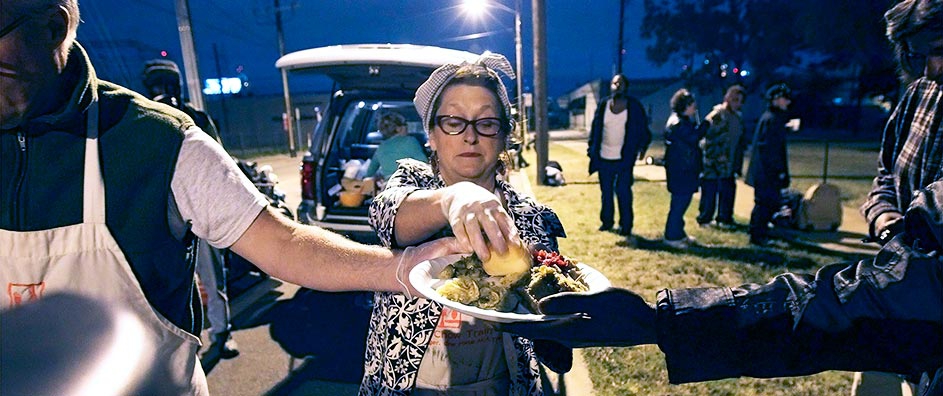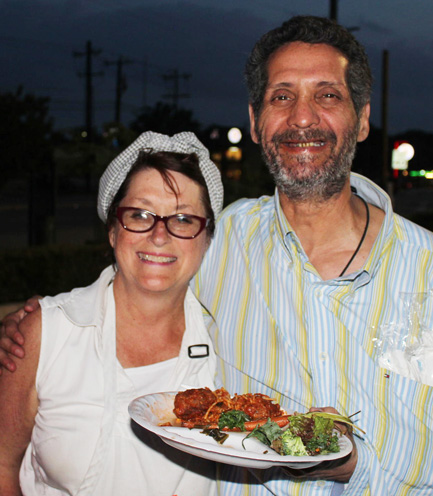The views expressed in our content reflect individual perspectives and do not represent the authoritative views of the Baha'i Faith.
“This is how I pray.”
These words came from Joan Cheever, a San Antonio woman cited last week by police officers for feeding the homeless. According to the San Antonio Express News article:
Joan Cheever, founder of the nonprofit mobile food truck known as the Chow Train, was cited last Tuesday by San Antonio police officers for feeding the homeless in Maverick Park. Cheever has been serving restaurant-quality meals to the city’s homeless population for the past 10 years, and has been profiled on Rachel (sic) Ray’s cooking show for her charitable efforts.
While Ms. Cheever may be a hero to Rachael Ray, to the policemen who wrote her the citation she is a lawbreaker guilty of serving the homeless from a vehicle other than her usual food truck. Her citation carries a potential $2000 fine.
A fine for feeding the poor and homeless–that makes no more sense to me than it does to Joan Cheever. When Ms. Cheever tried to explain that she felt compelled to do this work by her religious beliefs, one of the officers told her, “Ma’am, if you want to pray, go to church.”
That suggestion prompted Ms. Cheever to respond, “This is how I pray–when I cook this food and deliver it to the people who are less fortunate.”
Ms. Cheever plans to use the 1999 Texas Religious Freedom Restoration Act to argue that feeding the homeless is a free exercise of her faith. This application of RFRA makes sense to me. I was raised a Christian, have been a Baha’i my entire adult life and have made a lifelong study of religious Scripture. Every faith tradition has, at its core, a mandate to care for the poor and needy. The following passages only scratch the surface:
Be a treasure to the poor, an admonisher to the rich, an answerer of the cry of the needy, a preserver of the sanctity of thy pledge. – Gleanings from the Writings of Baha’u’llah, p. 285.
Hast thou observed him who belieth religion? That is he who repelleth the orphan, and urgeth not the feeding of the needy. Ah, woe unto worshippers who are heedless of their prayer; who would be seen (at worship) yet refuse small kindnesses! – Muhammad, Qur’an, Surih 107:1-7.
For I hungered, and ye gave Me meat; I was thirsty, and ye gave Me drink; I was a stranger, and ye took Me in; naked, and ye clothed Me; I was sick, and ye visited Me; I was in prison, and ye came unto Me.’ … ‘Verily I say unto you, inasmuch as ye have done it unto one of the least of these My brethren, ye have done it unto Me.’ – Christ, Matthew 25: 25-40.
Look, this was the iniquity of your sister Sodom: She and her daughter had pride, fullness of food, and abundance of idleness; neither did she strengthen the hand of the poor and needy. – Ezekiel 16: 48-50.
The man who has a good will for all, who is friendly and has compassion; who has no thoughts of ‘I’ or ‘mine’, whose peace is the same in pleasures and sorrows, and who is forgiving… this man loves me, and he is dear to me. – Krishna, Bhagavad Gita, 12: 13-14.
Beyond direct injunctions to treat the poor as “the trust of God”—a phrase Baha’u’llah uses—each of the founders of the world’s great Faiths tried to teach his followers that the commandments of God were meant to result in action, not merely doctrine and ritual. Thoughts of compassion are wonderful, but unless they result in compassionate behavior, they have limited results in the material world.
Baha’u’llah, the prophet and founder of the Baha’i Faith, whom Baha’is view as the latest in a series of divine messengers going back to the dawn of human life, made it clear that prayer or prayerful activity was not to be restricted to worship services. He said that it must bear fruit. A popular and long-lived introductory book to the Baha’i Faith—Baha’u’llah and the New Era—notes that:
Baha’u’llah teaches that one’s whole life should be a prayer, that work done in the right spirit is worship, that every thought, word and deed devoted to the Glory of God and the good of one’s fellows is prayer, in the truest sense of the word.” – J.E. Esslemont
Baha’is strive to live in an attitude of prayer. This does not mean secluding ourselves within the walls of a Baha’i Center or temple or our homes, sharing ourselves only with God, speaking to Him, alone. Don’t get me wrong: private communion with God in prayer is a necessary part of a Baha’i life. The Baha’i Faith continues the teachings given to us by the prophets of God throughout history, which have all insisted that service to others is not just one of many ways to serve God, but the highest form of service.
Baha’u’llah’s eldest son, Abdu’l-Baha, in whom Baha’is see the exemplary application of his father’s teachings, wrote much about this principle of service:
Be ye loving fathers to the orphan, and a refuge to the helpless, and a treasury for the poor, and a cure for the ailing. Be ye the helpers of every victim of oppression, the patrons of the disadvantaged. Think ye at all times of rendering some service to every member of the human race. Pay ye no heed to aversion and rejection, to disdain, hostility, injustice: act ye in the opposite way. Be ye sincerely kind, not in appearance only. Let each one of God’s loved ones centre his attention on this: to be the Lord’s mercy to man; to be the Lord’s grace. Let him do some good to every person whose path he crosseth, and be of some benefit to him. Let him improve the character of each and all, and reorient the minds of men. In this way, the light of divine guidance will shine forth, and the blessings of God will cradle all mankind: for love is light, no matter in what abode it dwelleth; and hate is darkness, no matter where it may make its nest. – Selections from the Writings of Abdu’l-Baha, p. 3.
Abdu’l-Baha also wrote that “Work done in the spirit of service is the highest form of worship.” – Divine Philosophy, p. 83
In other words: we should all try to emulate Joan Cheever’s beautiful prayer. She truly understands how we were meant to pray.

















Comments
Sign in or create an account
Continue with Googleor